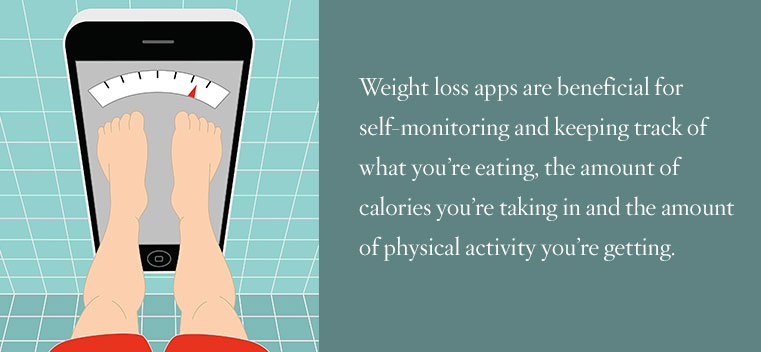
Fit by Phone
Tell us what you think. E-mail comments or questions to the editors at letters@northwestern.edu.
Ever wonder about the designations we use throughout Northwestern to identify alumni of the various schools of the University? See the complete list.
Find Us on Social Media
Alumni-built app takes simple approach to sustainable weight loss.
Paul Foryt had carried a few extra pounds since middle school. During college he had tried cutting calories and exercising, but nothing seemed to work. When he graduated from Northwestern in 2012, he was at his heaviest, tipping the scales at 210 pounds.
But after graduation, Foryt ’12 started making small, incremental lifestyle changes — first measuring and increasing his protein intake, then cutting calories and upping his veggie portions, and finally adding cardio and strength-training exercises.
“I really focused on small things because I knew that taking too much on at once was just going to lead to failure,” says Foryt, who has shed more than 70 pounds and kept the weight off. “If you take too much on at once, you just get overwhelmed and eventually fall back to your old habits.”
His co-workers at the Lake Forest, Ill.–based medical device maker Hospira began to take notice, marveling at his transformation while drooling over his healthy and delicious lunches. His Northwestern classmates Ethan Ensler ’12 and Kevin Packer ’12, both fitness geeks who worked with Foryt at Hospira, began to take notice too.
The trio of biomedical engineering majors, who had worked together on a senior project for Baxter, thought Foryt might be onto something with his simple, slow-and-steady, small steps approach to fitness. Using that model, they set out to build an app focused on sustainable weight loss.
“Eventually we got to the point where we were spending almost an equal amount of time at Hospira and working on the side on the app,” says Foryt. “It wasn’t good for our lifestyles. We decided, much to the disappointment of our parents, to quit our full-time jobs and work on SimpliFit, even though we had no funding whatsoever.”
That was in January 2014. Working with a prominent nutritional coach and a board-certified family medicine physician who focuses on lifestyle changes to treat chronic disease, they built the SimpliFit program and rolled out the beta version of the app in summer 2014. More than 1,000 people signed up in the first two months. (Makoa Kawabata ’11, an attorney in California, is also part of the SimpliFit team, working part time as vice president of corporate development.)
Packer says SimpliFit works because it offers a personalized approach to incremental lifestyle changes, rather than an automated one-size-fits-all program. “When someone goes into the app, they take an assessment to figure out their biggest challenges in their lifestyle,” says Packer. The assessment looks at diet and exercise, as well as sleep, stress, mindset and cravings.
The next iteration of the app will include an online coaching program and more community aspects — opportunities to connect with other SimpliFit users for accountability, motivation and camaraderie. “You need that personal human touch,” says Packer.
That social support is key, says Bonnie Spring, a professor of preventive medicine at the Feinberg School of Medicine. Friends serve as good medicine, she says, “and it’s not just social support in the real world. Even social support in the virtual world, from friends you’ve never even met, that works too.”
Spring, director of the Center for Behavior and Health at the Feinberg School of Medicine, led a recent study that found that online dieters with a high social embeddedness — who logged in regularly and friended other members — lost more weight than users who had less interaction in the community. Studying data from the online weight loss community CalorieKing, Spring and chemical and biological engineering professor Luís Nunes Amaral discerned that users who did not connect with others lost 5 percent of their body weight, while users with more than 10 friends lost more than 8 percent.
“We’ve known that social support helps,” says Spring. “I guess it surprised me that you could have a support mechanism that was that effective when you really didn’t even know the people.”
Weight loss apps, she says, are beneficial for self-monitoring and keeping track of what you’re eating, the amount of calories you’re taking in and the amount of physical activity you’re getting. Her advice: “Use the technology, make it part of your routine and get involved with whatever community it provides.”



 Facebook
Facebook Twitter
Twitter Email
Email


